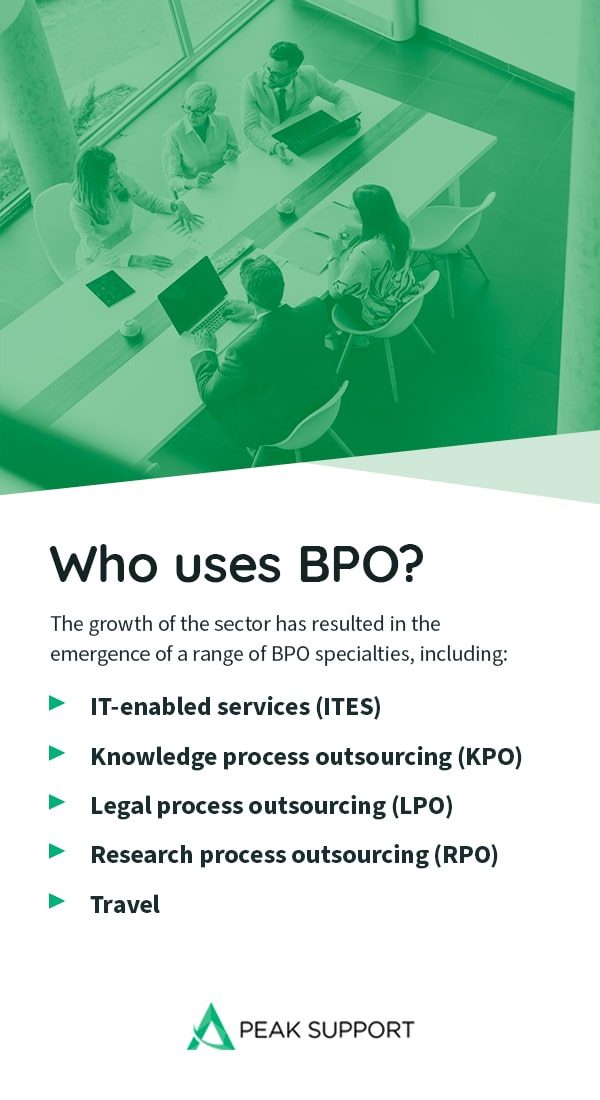-
Services
-
Locations
- Philippines
- United States
- Colombia
- Eastern Europe
Locations -
Industries
-
Resources
- E-Books
- Blog
- Case Studies
Resources - About Us
- Careers
Business process outsourcing (BPO) is gaining traction around the world. The global market is expected to reach $450 billion by 2027 and over 50% of executives outsource business functions today. As BPO expands into multiple sectors, more and more businesses are taking advantage of its benefits.
Understanding the ins and outs of the BPO industry matters to any business considering outsourcing. If you find a reliable BPO partner to work with, it can change how your company operates. Taking care of the small things lets you focus on what matters — growing your business and satisfying your customers.
What is business process outsourcing?
Business process outsourcing involves handing over business-related operations to third-party service providers. While you’ve probably hired freelancers in the past, BPO is slightly different. Instead of outsourcing specific tasks, you outsource whole business functions such as marketing, customer services, accounting and payroll.
In its early stages, manufacturing companies used BPO almost exclusively to help with supply chain management. Over the years, the advantages of BPO became apparent, and businesses in other industries started to pick up on the trend. Now, organizations of all sizes outsource business processes across industries. BPO is an industry all its own, with many companies specializing in providing BPO services worldwide.
Internally, completing a specific job costs a certain amount of money. BPO lowers these costs by outsourcing them to an outside professional.

How does business process outsourcing work?
BPO covers many functions, focused on two main service areas:
- Back office, non-customer-facing operations like payroll, compliance, IT service, human resources and quality assurance.
- Front office, customer-facing services like sales, marketing and support.
BPO starts when your business realizes it can benefit from outsourcing one or more business functions. From there, you start researching the different companies that offer the service for the business function you need. Reaching out to several providers is standard so you can ensure you find the best fit.
Conversations with your BPO company are essential. It’s best to make your requirements clear so your partner can create a tailored solution built to meet your needs. Your relationship with a BPO partner will differ slightly from any other company, as relationships between organizations and BPOs are often unique. BPOs all have different specializations and create unique partnerships for each set of business requirements. Depending on these factors, you will then draw up a contract — often called a service level agreement (SLA) or master service agreement (MSA) — that details the terms of your partnership.
It’s common for companies to request more than one SLA, so they can compare them and choose the provider that offers the best value. Once you’ve selected your BPO, you progress to drawing up an agreement more detailed than your SLA to outline how the BPO will manage each project, often called a statement of work (SOW). You can revise this agreement to ensure a long and fruitful partnership.
What are the different types of BPO?
BPO is an umbrella term that covers several subcategories of outsourcing business processes. Depending on your requirements, you might consider any of the following types of BPO.
Back-office BPO
This BPO type refers to contracting non-customer-facing services, including IT support, human resources, process automation and more. As the industry has grown, more subtypes have appeared in this category. Outsourcing these back-office processes allows your business to focus on its core goals and mission instead of internal training and onboarding.
Front-office BPO
As the name suggests, front-office BPO services are client-facing and include marketing, sales, customer services and tech support. Organizations often outsource these services because the relevant BPOs have specialized technical knowledge and can provide remote assistance. Your company can benefit from unique knowledge to provide a better customer experience — one of the many reasons front-office BPO is a popular choice.
BPO types by location
BPO types can vary depending on their location. Modern technology allows businesses to outsource services from around the world depending on their needs. The three main types are:
- Offshore BPO: Offshore BPO is when your organization outsources services overseas. Reasons for choosing offshore BPO range from political stability to available resources and tax savings. For example, many companies outsource customer service departments offshore by working with call centers across the globe. Offshore outsourcing can result in significant cost savings.
- Nearshore BPO: Although this type of BPO still involves outsourcing services in a different country, it refers to countries closer to yours. Mexico and Canada would be examples of nearshore BPO for U.S. businesses. Nearshore BPO is viable when nearby countries offer specific skills and cost savings.
- Onshore BPO: Also known as domestic outsourcing, this type of BPO involves outsourcing BPO services within the boundaries of your own country.

Who uses BPO?
BPO has come a long way since its beginnings in the manufacturing industry. Today, many companies use BPO services across industries as they have discovered the many financial and operational benefits. The growth of the sector has resulted in the emergence of a range of BPO specialties, including:
- IT-enabled services (ITES): This BPO type uses the internet to deliver IT services to businesses, such as IT analytics and production support.
- Knowledge process outsourcing (KPO): This detailed form of BPO is suitable for many organizations, as it offers various services, including research, administration and analysis.
- Legal process outsourcing (LPO): As the name suggests, legal firms can use this type of BPO to outsource high-level and low-level legal services ranging from transcriptions and legal research to drafting patents and agreements.
- Research process outsourcing (RPO): This subset of KPO focuses specifically on research and analysis that supports businesses in the financial, marketing, investment and biotech industries, to name a few.
- Travel: For businesses that require travel, a travel BPO service takes care of all the appropriate steps, from booking flights and making reservations to vehicle rentals.
BPO works with your company to provide specialized services you may not be able to get from your in-house team and infrastructure. Depending on your needs, they can add expert services to your existing setup, taking the tasks off your team’s shoulders and freeing them up to focus on critical business tasks while simultaneously providing quality service and technology.
Why use BPO?
BPO aims to streamline your processes and operations by providing access to specialized expert services in a particular field. The advantages of BPO are significant, and you can expect some of the following outcomes when you subcontract BPO services.
Enhanced operational flexibility
Outsourcing noncore competency processes allows your internal team to focus exclusively on core competencies. Without the added time and effort of completing noncore tasks, your team can innovate and take your business to the next level. In addition, you can manage risks and change more effectively when introducing new products or services, and assign your internal resources to more critical functions, knowing your BPO provider is taking care of the “nuts and bolts.”
Increased access to innovative technology
Many BPO providers have access to specialized technology — 51% of businesses cite access to new capabilities as one of the main reasons they outsource. Many BPO companies invest in the latest technology to support their business line specializations. As a result, organizations that outsource gain access to these innovative technologies without the cost of buying and running them.
Greater access to experts
Just as they invest in the latest technologies, BPO companies attract and hire top talent with credentials in specialized areas in order to maintain a competitive edge. This top-tier talent benefits you as a business by granting you access to that same expertise.
Reduced costs
Many BPO companies are free of geographical limitations and can operate in countries with lower income taxes. They pass their savings due to hiring from other countries to their clients. With 51% of companies citing cost savings as the primary reason they outsource, the savings are significant.
In addition, when you partner with a BPO, you can save on overhead costs such as rent and hardware. Outsourcing also gives you the opportunity to use variable cost models, providing yet another way for your business to save money.
Advanced reporting
BPO organizations have access to advanced technologies like artificial intelligence (AI), automation and machine learning. This technology provides your business with fast and cutting-edge reporting, including financial forecasting.
Improved change responses
With access to all the above benefits, your business can adapt better when your industry or customers’ needs change rapidly. You can adjust your strategy to anticipate these changes and maintain a competitive edge. Advanced reporting access can help you forecast upcoming trends so you can adapt before it becomes unavoidable.
Specialized risk management
Outsourcing reduces risks in the outsourced areas, as you’re handing them over to experts who know how to avoid risk in specialized areas. They can apply more significant attention to detail in their technical fields, allowing you to overcome challenges and minimize damage caused by unexpected events.
Improved noncore functions
BPO businesses often specialize in noncore business functions, giving your company top-tier capabilities in these areas. When you hand these functions over to the experts, you can focus on your key processes. For example, you can develop an innovative product instead of working through payroll issues.
Expanded global presence
Many BPO companies can serve customers around the clock in several languages. As a result, you can expand your reach and take the pressure off your local team.
Increased revenue
BPO goes beyond saving you money. It can make you money, too. Improving your customer satisfaction (CSAT) can help you retain clients by outsourcing BPO tasks like communications and customer support. Customers care about every interaction they have with your brand, and outsourcing the experts leaves them satisfied, improving your retention and increasing the likelihood of your customers recommending you. In other words, it helps you keep your current customers and attract new ones.
When to use BPO
BPO has significant benefits, and it is critical to know when to apply them to your business. The right time to partner with a BPO business depends on your needs. As these case studies illustrate, one of the critical times to consider BPO is when your business experiences growth. BPO is the ideal method of keeping up with internal and external demands without letting your in-house capabilities limit your progress.
These business process outsourcing examples can help you decide if the time is right to make the move to BPO.
American Exchange Group
American Exchange Group encountered a challenge with the increasing number of incoming customer service tickets for their iTouch smartwatches. They needed a front-office BPO partner experienced in technical support and troubleshooting. After several false starts, they partnered with Peak Support to help them with training and communications. Eventually, they outsourced their customer support to the Philippines.
With help from Peak Support, their CSAT is at 96% — a massive leap compared to their pre-partnership CSAT of 60%.
Wildgrain
Wildgrain is a bake-from-frozen subscription business that experienced exponential growth amid the COVID-19 pandemic. This rapid growth left their internal teams drowning in marketing responsibilities. Since they’re passionate about providing the best customer service possible, they knew they needed to find a way to keep up.
Wildgrain signed on with Peak Support, outsourcing their email, social media, marketing onboarding, communications and member retention. They maintained a 97% CSAT after transitioning to an outsourced team, and their own team is free to focus on their core business.

The expected results of BPO and effects on overall business
The expected results of BPO are to cut costs, free up your internal teams and focus on core aspects of your operations. When you outsource and share their workload, you increase your ability to compete in the market. When you partner with a BPO provider, you can reduce costs, increase customer satisfaction rates, streamline your internal operations and focus on what you do best — growing your business.
In addition to the internal effects, BPO has a far-reaching impact on the global economy, including:
- Increased employment opportunities: As the BPO industry grows, so do employment opportunities worldwide. Businesses can hire offshore, and people are reaching out for part-time and full-time employment, regardless of where they are.
- High quality of work: As BPO becomes more prominent, the competition in the industry escalates. BPO companies must maintain a competitive position by hiring the best talent possible, which increases the overall quality of work throughout the industry.
- Enhanced opportunities for small businesses: Outsourcing is entirely scalable, so you can find quality services at reduced costs regardless of your business size. Small companies and startups can benefit from BPO services for marketing, IT support and more. They can access the technology they need to succeed without the cost of buying it.

Explore business process outsourcing with Peak Support
Sometimes it’s what happens behind the scenes that makes the most significant difference. Your customers may not know you’re outsourcing business functions, but they’ll feel the difference in your service. Even your employees are likely to notice the difference. If you’re considering BPO for your business, Peak Support is an excellent place to start. We offer services to high-growth companies, including customer support and business process outsourcing.
Our experienced, passionate team is ready to walk you through adding BPO to your current business model — contact us today to get started!
- How does business process outsourcing work?
- What is business process outsourcing?
- How does BPO work?
- What are the different types of BPO?
- BPO types by location
- Who uses BPO?
- Why use BPO?
- When to use BPO
- American Exchange Group
- Wildgrain
- The expected results of BPO and effects on overall business
- Explore business process outsourcing with Peak Support

